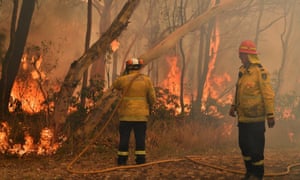Frustrated by government ‘denial’, Emergency Leaders for Climate Action ready to go it alone on bushfire crisis summit
Former emergency leaders who have been pushing the Morrison
government to take action on the climate say they will “go it alone” and
convene their own summit on the bushfire crisis.
The Emergency Leaders for Climate Action say they will hold the summit after the current bushfire season because of their “huge disappointment in the lack of national leadership during a bushfire crisis”.
It comes as fires raged across New South Wales and Western Australia on Monday and as Australia was named as one of a handful of countries responsible for thwarting a global deal on the rulebook of the Paris climate agreement.
A week ago, former fire chiefs Greg Mullins, from NSW, and Lee Johnson, from Queensland, called for a national summit on how the country should prepare for and resource bushfire emergencies in a changed climate.The Emergency Leaders for Climate Action say they will hold the summit after the current bushfire season because of their “huge disappointment in the lack of national leadership during a bushfire crisis”.
It comes as fires raged across New South Wales and Western Australia on Monday and as Australia was named as one of a handful of countries responsible for thwarting a global deal on the rulebook of the Paris climate agreement.
Both men are part of Emergency Leaders for Climate Action, a group of former fire and emergency chiefs who had warned the government that Australia faced a disastrous fire season.
The group’s ranks have expanded from 23 to 29 members since it first warned the government earlier this year that Australia was unprepared for the escalating climate threat.
Late last week the prime minister, Scott Morrison, moved to reassure voters he understood the fires were a national emergency and said climate change was one of many contributing factors to the current fire season.
But Mullins said those “many factors are all related to climate change”.
“What we feel is that there’s just still this denial of the problem and where we have denial of the problem, there’s not going to be any action,” he said.
“So we’ll go it alone. We’ll arrange a national summit that will look at building standards, fuel management practices, response capability and national coordination arrangements.
“We’ll invite the prime minister and we hope that he comes too.”
The Emergency Leaders for Climate Action said Australia had “embarrassed” itself through its performance at the United Nations climate conference in Madrid at a time when people around the world were watching reports about the country burning.
Mike Brown, a former chief officer for the Tasmanian Fire Service, said the outlook for the next three months was for drier and hotter than average conditions for much of the country.
“That doesn’t stand well for how things develop into the summer,” he said.
Brown said the eastern half of Tasmania, including all of the east coast and the Derwent Valley, was particularly dry. It follows the summer of 2018-19, when huge fires hit world heritage forest.
“I’m a big fan of fuel reduction but the weather window in which to do fuel reduction is becoming narrower due to hotter and windier weather due to climate change,” Brown said.
“You also can’t do fuel reduction in wet forest types. We think that due to the changing climate there needs to be a fresh approach to manage fires and just how people in communities are going to be managed into the future when we’re facing increased fire weather.”
The proposed summit would include fire service workers, Indigenous landowners, the military, the insurance industry and local governments. Mullins said it would occur in late March, but the timing was subject to change if the bushfire season ran for longer than usual.

No comments:
Post a Comment